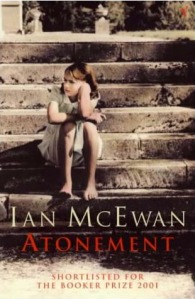Fiction – paperback; Vintage; 372 pages; 2002.
Shortlisted for the Booker Prize in 2002, part one of Ian McEwan‘s Atonement features some of the best fiction I have ever read.
Set on the hottest day of the summer of 1934, it evokes richly the individual lives of a family living in a lavish country house, and the preparations they undergo to stage a welcome home dinner for their eldest son.
But the happiness and excitement of the festivities soon turn on their head when a tragedy occurs on the estate and the finger of blame is pointed at the wrong person. This is something for which 13-year-old Briony Tallis spends the rest of her life trying to atone.
Unfortunately, I found that parts two and three of the book did not live up to the promise of the first (it didn’t help that I had guessed the perpetrator of the crime).
While McEwan’s writing is gorgeous, with a deep undercurrent of suspense running throughout, I found that the “tricks” he played on the reader towards the end were mean-spirited and disappointing.
 ‘Atonement’ by Ian McEwan, first published in 2001, is listed in Peter Boxall’s 1001 Books You Must Read Before You Die, where it states that the epilogue “brings into question the author’s struggle to relinquish control over the reaction of his readers”! It adds that some of the novel’s themes include the “challenges of writing, the burden of guilt, and, above all, the danger of interpretation”.
‘Atonement’ by Ian McEwan, first published in 2001, is listed in Peter Boxall’s 1001 Books You Must Read Before You Die, where it states that the epilogue “brings into question the author’s struggle to relinquish control over the reaction of his readers”! It adds that some of the novel’s themes include the “challenges of writing, the burden of guilt, and, above all, the danger of interpretation”.


I completely agree 🙂
I was mesmerised for the first part, but felt let down with the remainder of the book.
I enjoyed McEwan’s seemless changing between the characters take on the fateful day, it makes other authors (only Tracy Chevalier) who employ that technique look rather clunky in their approach.
LikeLike
It’s been awhile since I read this, but I still remember the first part of this book as if I read it yesterday. But the remainder of the novel has gone to the same spot old telephone numbers/black socks/biros go! – ie. a big black hole.
Glad you enjoyed it though.
LikeLike
I enjoyed the very industrial, mechanical tone to Part Two of Atonement, complimenting the situation. The crudeness and the pace with which McEwan developed (and essentially aged) Robbie’s character gave a true sense of reality associated with coming of age. However, compared to Part One – an exquisitely rich and heated flow of ideas – it was an extreme contrast in style. I do think this was intentional.
LikeLike